- Home
- Lemony Snicket
The End asoue-13 Page 12
The End asoue-13 Read online
Page 12
"Where were you?" Finn said. "We waited as long as we could for you to return, but we had to leave your friend behind and begin the mutiny."
"You left Kit out there alone?" Violet said. "You promised you'd stay with her."
"And you promised us weapons," said Erewhon. "Where are they, Baudelaires?"
"We don't have any," Klaus admitted. "Ishmael was at the arboretum."
"Count Olaf was right," Erewhon said. "You failed us, Baudelaires."
"What do you mean, 'Count Olaf was right'?" Violet demanded.
"What do you mean, 'Ishmael was at the arboretum'?" Finn demanded.
"What do you mean, what do I mean?" Erewhon demanded.
"What you mean what you mean what I mean?" Sunny demanded.
"Please, everyone!" Ishmael cried from his clay chair. "I suggest we all take a few sips of cordial and discuss this cordially!"
"I'm tired of drinking cordial," Professor Fletcher said, "and I'm tired of your suggestions, Ishmael!"
"Call me Ish," the facilitator said.
"I'm calling you a bad facilitator!" retorted Calypso.
"Please, everyone!" Ishmael cried again, with a nervous tug at his beard. "What is all this argy-bargy about?"
"I'll tell you what it's about," Alonso said. "I washed up on these shores many years ago, after enduring a terrible storm and a dreadful political scandal."
"So what?" Rabbi Bligh asked. "Eventually, everyone washes up on these shores."
"I wanted to leave my unfortunate history behind," Alonso said, "and live a peaceful life free from trouble. But now there are some colonists talking of mutiny. If we're not careful, this island will become as treacherous as the rest of the world!"
"Mutiny?" Ishmael said in horror. "Who dares talk of mutiny?"
"I dare," Erewhon said. "I'm tired of your facilitation, Ishmael. I washed ashore on this island after living on another island even farther away. I was tired of a peaceful life, and ready for adventure. But whenever anything exciting arrives on this island, you immediately have it thrown into the arboretum!"
"It depends on how you look at it," Ishmael protested. "I don't force anyone to throw anything away."
"Ishmael is right!" Ariel cried. "Some of us have had enough adventure for a lifetime! I washed up on these shores after finally escaping from prison, where I had disguised myself as a young man for years! I've stayed here for my own safety, not to participate in more dangerous schemes!"
"Then you should join our mutiny!" Sherman cried. "Ishmael is not to be trusted! We abandoned the Baudelaires on the coastal shelf, and now he's brought them back!"
"The Baudelaires never should have been abandoned in the first place!" Ms. Marlow cried. "All they wanted to do was help their friend!"
"Their friend is suspicious," claimed Mr. Pitcairn. "She arrived on a raft of books."
"So what?" said Weyden. "I arrived on a raft of books myself."
"But you abandoned them," Professor Fletcher pointed out.
"She did nothing of the sort!" cried Larsen. "You helped her hide them, so you could force those children to read!"
"We wanted to learn to read!" Friday insisted.
"You're reading?" Mrs. Caliban gasped in astonishment.
"You shouldn't be reading!" cried Madame Nordoff.
"Well, you shouldn't be yodeling!" cried Dr. Kurtz.
"You're yodeling?" Rabbi Bligh asked in astonishment. "Maybe we should have a mutiny after all!"
"Yodeling is better than carrying a flashlight!" Jonah cried, pointing at Finn accusingly.
"Carrying a flashlight is better than hiding a picnic basket!" Sadie cried, pointing at Erewhon.
"Hiding a picnic basket is better than pocketing a whisk!" Erewhon said, pointing at Sunny.
"These secrets will destroy us!" Ariel said. "Life here is supposed to be simple!"
"There's nothing wrong with a complicated life," said Byam. "I lived a simple life as a sailor for many years, and I was bored to tears until I was shipwrecked."
"Bored to tears?" Friday said in astonishment. "All I want is the simple life my mother and father had together, without arguing or keeping secrets."
"That's enough," Ishmael said quickly. "I suggest that we stop arguing."
"I suggest we continue to argue!" cried Erewhon.
"I suggest we abandon Ishmael and his supporters!" cried Professor Fletcher.
"I suggest we abandon the mutineers!" cried Calypso.
"I suggest better food!" cried another islander.
"I suggest more cordial!" cried another.
"I suggest a more attractive robe!"
"I suggest a proper house instead of a tent!"
"I suggest fresh water!"
"I suggest eating bitter apples!"
"I suggest chopping down the apple tree!"
"I suggest burning up the outrigger!"
"I suggest a talent show!"
"I suggest reading a book!"
"I suggest burning all books!"
"I suggest yodeling!"
"I suggest forbidding yodeling!"
"I suggest a safe place!"
"I suggest a complicated life!"
"I suggest it depends on how you look at it!"
"I suggest justice!"
"I suggest breakfast!"
"I suggest we stay and you leave!"
"I suggest you stay and we leave!"
"I suggest we return to Winnipeg!"
The Baudelaires looked at one another in despair as the mutinous schism worked its way through the colony. Seashells hung open at the waists of the islanders, but there was no cordiality evident as the islanders turned against one another in fury, even if they were friends, or members of the same family, or shared a history or a secret organization. The siblings had seen angry crowds before, of course, from the mob psychology of the citizens in the Village of Fowl Devotees to the blind justice of the trial at the Hotel Denouement, but they had never seen a community divide so suddenly and so completely. Violet, Klaus, and Sunny watched the schism unfold and could imagine what the other schisms must have been like, from the schism that split V.F.D., to the schism that drove their parents away from the very same island, to all the other schisms in the world's sad history, with every person suggesting something different, every story like a layer of an onion, and every unfortunate event like a chapter in an enormous book. The Baudelaires watched the terrible argy-bargy and wondered how they could have hoped the island would be a safe place, far from the treachery of the world, when eventually every treachery washed up on its shores, like a castaway tossed by a storm at sea, and divided the people who lived there. The arguing voices of the islanders grew louder and louder, with everyone suggesting something but nobody listening to anyone else's suggestions, until the schism was a deafening roar that was finally broken by the loudest voice of all.
"SILENCE!" bellowed a figure who entered the tent, and the islanders stopped talking at once, and stared in amazement at the person who stood glaring at them in a long dress that bulged at the belly.
"What are you doing here?" gasped someone from the back of the tent. "We abandoned you on the coastal shelf!"
The figure strode into the middle of the tent, and I'm sorry to tell you that it was not Kit Snicket, who was still in a long dress that bulged at the belly on top of her library raft, but Count Olaf, whose bulging belly, of course, was the diving helmet containing the Medusoid Mycelium, and whose orange and yellow dress the Baudelaires suddenly recognized as the dress Esmé Squalor wore on top of the Mortmain Mountains, a hideous thing fashioned to look like an enormous fire, which had somehow washed onto the island's shores like everything else. As Olaf paused to give the siblings a particularly wicked smile, the children tried to imagine the secret history of Esme's dress, and how, like the ring Violet still held in her hand, it had returned to the Baudelaires' story after all this time.
"You can't abandon me," the villain snarled to the islander. "I'm the king of Olaf-Land."
&nbs
p; "This isn't Olaf-Land," Ishmael said, with a stern tug on his beard, "and you're no king, Olaf."
Count Olaf threw back his head and laughed, his tattered dress quivering in mirth, a phrase which here means "making unpleasant rustling noises." With a sneer, he pointed at Ishmael, who still sat in the chair. "Oh, Ish," he said, his eyes shining bright, "I told you many years ago that I would triumph over you someday, and at last that day has arrived. My associate with the weekday for a name told me that you were still hiding out on this island, and—"
"Thursday," Mrs. Caliban said.
Olaf frowned, and blinked at the freckled woman. "No," he said."Monday. She was trying to blackmail an old man who was involved in a political scandal."
"Gonzalo," Alonso said.
Olaf frowned again. "No," he said. "We'd gone bird-watching, this old man and I, when we decided to rob a sealing schooner owned by-"
"Humphrey," Weyden said.
"No," Olaf said with another frown. "There was some argument about his name, actually, as a baby adopted by his orphaned children also bore the same name."
"Bertrand," Omeros said.
"No," Olaf said, and frowned yet another time. "The adoption papers were hidden in the hat of a banker who had been promoted to Vice President in Charge of Orphan Affairs."
"Mr. Poe?" asked Sadie.
"Yes," Olaf said with a scowl, "although at the time he was better known under his stage name. But I'm not here to discuss the past. I'm here to discuss the future. Your mutineering islanders let me out of this cage, Ishmael, to force you off the island and crown me as king!"
"King?" Erewhon said. "That wasn't the plan, Olaf."
"If you want to live, old woman," Olaf said rudely, "I suggest that you do whatever I say."
You're already giving us suggestions?" Brewster said incredulously. "You're just like Ishmael, although your outfit is prettier."
"Thank you," Count Olaf said, with a wicked smile, "but there's another important difference between me and this foolish facilitator."
"Your tattoo?" Friday guessed.
"No," Count Olaf said, with a frown. "If you were to wash the clay off Ishmael's feet, you'd see he has the same tattoo as I do."
"Eyeliner?" guessed Madame Nordoff.
"No," Count Olaf said sharply. "The difference is that Ishmael is unarmed. He abandoned his weapons long ago, during the V.F.D. schism, refusing to use violence of any sort. But today, you'll all see how foolish he is." He paused, and ran his filthy hands along his bulging belly before turning to the facilitator, who was taking something from Omeros's hands. "I have the only weapon that can threaten you and your supporters," he bragged. "I'm the king of Olaf-Land, and there's nothing you and your sheep can do about it."
"Don't be so sure about that," Ishmael said, and raised an object in the air so everyone could see it. It was the harpoon gun that had washed ashore with Olaf and the Baudelaires, after being used to fire at crows at the Hotel Denouement, and at a self-sustaining hot air mobile home in the Village of Fowl Devotees, and at a cotton-candy machine at a county fair when the Baudelaires' parents were very, very young. Now the weapon was adding another chapter to its secret history, and was pointing right at Count Olaf. "I had Omeros keep this weapon handy," Ishmael said, "instead of tossing it in the arboretum, because I thought you might escape from that cage, Count Olaf, just as I escaped from the cage you put me in when you set fire to my home."
"I didn't set that fire," Count Olaf said, his eyes shining bright.
"I've had enough of your lies," Ishmael said, and stood up from his chair. Realizing that the facilitator's feet were not injured after all, the islanders gasped, which requires a large intake of breath, a dangerous thing to do if spores of a deadly fungus are in the air. "I'm going to do what I should have done years ago, Olaf, and slaughter you. I'm going to fire this harpoon gun right into that bulging belly of yours!"
"No!" screamed the Baudelaires in unison, but even the combined voices of the three children were not as loud as Count Olaf's villainous laughter, and the facilitator never heard the children's cry as he pulled the bright red trigger of this terrible weapon. The children heard a click! and then a whoosh! as the harpoon was fired, and then, as it struck Count Olaf right where Ishmael had promised, they heard the shattering of glass, and the Medusoid Mycelium, with its own secret history of treachery and violence, was free at last to circulate in the air, even in this safe place so far from the world. Everyone in the tent gasped—islanders and colonists, men and women, children and orphans, volunteers and villains and everyone in between. Everyone breathed in the spores of the deadly fungus as Count Olaf toppled backward onto the sand, still laughing even as he gasped himself, and in an instant the schism of the island was over, because everyone in this place—including, of course, the Baudelaire orphans—was suddenly part of the same unfortunate event.
Chapter Twelve
It is a curious thing, but as one travels the world getting older and older, it appears that happiness is easier to get used to than despair. The second time you have a root beer float, for instance, your happiness at sipping the delicious concoction may be not quite as enormous as when you first had a root beer float, and the twelfth time your happiness may be still less enormous, until root beer floats begin to offer you very little happiness at all, because you have become used to the taste of vanilla ice cream and root beer mixed together. However, the second time you find a thumbtack in your root beer float, your despair is much greater than the first time, when you dismissed the thumbtack as a freak accident rather than part of the scheme of the soda jerk, a phrase which here means "ice cream shop employee who is trying to injure your tongue," and by the twelfth time you find a thumbtack your despair is even greater still, until you can hardly utter the phrase "root beer float" without bursting into tears. It is almost as if happiness is an acquired taste, like coconut cordial or ceviche, to which you can eventually become accustomed, but despair is something surprising each time you encounter it. As the glass shattered in the tent, the Baudelaire orphans stood and stared at the standing figure of Ishmael, but even as they felt the Medusoid Mycelium drift into their bodies, each tiny spore feeling like the footstep of an ant walking down their throats, they could not believe that their own story could contain such despair once more, or that such a terrible thing had happened.
"What happened?" Friday cried. "I heard glass breaking!"
"Never mind the breaking glass," Erewhon said. "I feel something in my throat, like a tiny seed!"
"Never mind your seedy throat," Finn said. "I see Ishmael standing up on his own two feet!"
Count Olaf cackled from the white sand where he lay. With one dramatic gesture he yanked the harpoon out of the mess of broken helmet and tattered dress at his stomach, and threw it at Ishmael’s clay feet. "The sound you heard was the shattering of a diving helmet," he sneered. "The seeds you feel in your throats are the spores of the Medusoid Mycelium, and the man standing on his own two feet is the one who has slaughtered you all!"
"The Medusoid Mycelium?" Ishmael repeated in astonishment, as the islanders gasped again."On these shores? It can't be! I've spent my life trying to keep the island forever safe from that terrible fungus!"
"Nothing's safe forever, thank goodness," Count Olaf said, "and you of all people should know that eventually everything washes up on these shores. The Baudelaire family has finally returned to this island after you threw them off years ago, and they brought the Medusoid Mycelium with them."
Ishmael's eyes widened, and he jumped off the edge of the sleigh to stand and confront the Baudelaire orphans. As his feet landed on the ground, the clay cracked and fell away, and the children could see that the facilitator had a tattoo of an eye on his left ankle, just as Count Olaf had said. "You brought the Medusoid Mycelium?" he asked. "You had a deadly fungus with you all this time, and you kept it a secret from us?"
"You're a fine one to talk about keeping secrets!" Alonso said. "Look at your healthy feet, Ishmael! Yo
ur dishonesty is the root of the trouble!"
"It's the mutineers who are the root of the trouble!" cried Ariel. "If they hadn't let Count Olaf out of the cage, this never would have happened!"
"It depends on how you look at it," Professor Fletcher said. "In my opinion, all of us are the root of the trouble. If we hadn't put Count Olaf in the cage, he never would have threatened us!"
"We're the root of the trouble because we failed to find the diving helmet," Ferdinand said. "If we'd retrieved it while storm scavenging, the sheep would have dragged it to the arboretum and we would have been safe!"
" Omerosis the root of the trouble," Dr. Kurtz said, pointing at the young boy. "He's the one who gave Ishmael the harpoon gun instead of dumping it in the arboretum!"
"It's Count Olaf who's the root of the trouble!" cried Larsen. "He's the one who brought the fungus into the tent!"
"I'm not the root of the trouble," Count Olaf snarled, and then paused to cough loudly before continuing. "I'm the king of the island!"
"It doesn't matter whether you're king or not," Violet said. "You've breathed in the fungus like everyone else."
"Violet's right," Klaus said. "We don't have time to stand here arguing." Even without his commonplace book, Klaus could recite a poem about the fungus that was first recited to him by Fiona shortly before she had broken his heart. "A single spore has such grim power /That you may die within the hour," he said. "If we don't quit our fighting and work together, we'll all end up dead."
The tent was filled with ululation, a word which here means "the sound of panicking islanders."

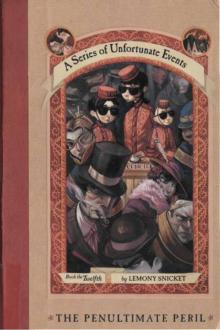 The Penultimate Peril
The Penultimate Peril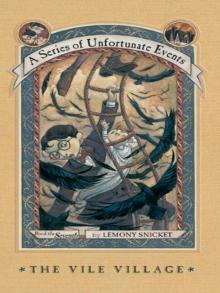 The Vile Village
The Vile Village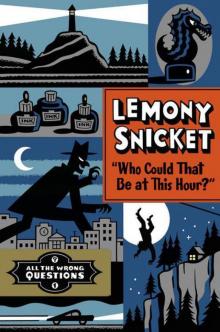 Who Could That Be at This Hour?
Who Could That Be at This Hour?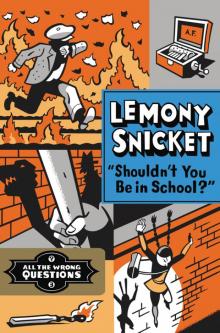 Shouldn't You Be in School?
Shouldn't You Be in School?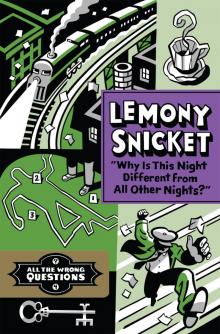 Why Is This Night Different From All Other Nights?
Why Is This Night Different From All Other Nights?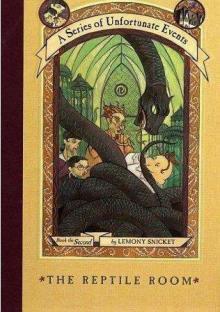 The Reptile Room
The Reptile Room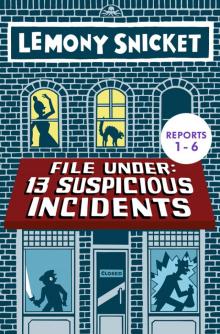 File Under: 13 Suspicious Incidents (1-6)
File Under: 13 Suspicious Incidents (1-6) The End
The End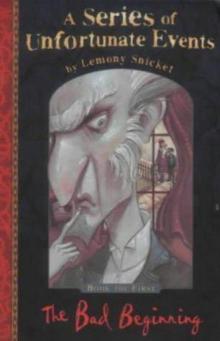 The Bad Beginning
The Bad Beginning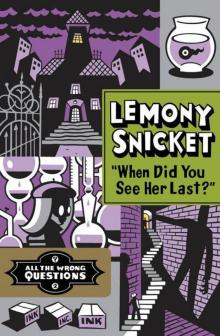 When Did You See Her Last?
When Did You See Her Last?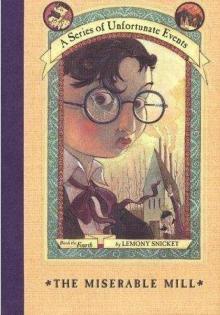 The Miserable Mill
The Miserable Mill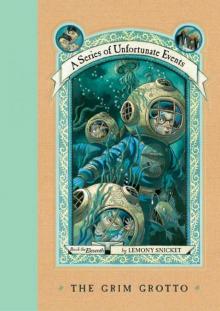 The Grim Grotto
The Grim Grotto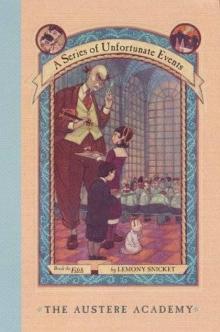 The Austere Academy
The Austere Academy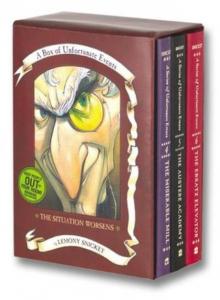 The Ersatz Elevator
The Ersatz Elevator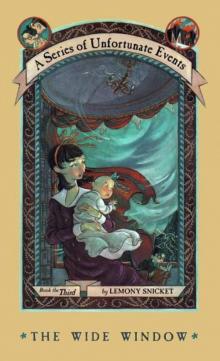 The Wide Window
The Wide Window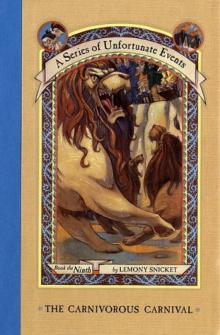 The Carnivorous Carnival
The Carnivorous Carnival A Series of Unfortunate Events Box: The Complete Wreck
A Series of Unfortunate Events Box: The Complete Wreck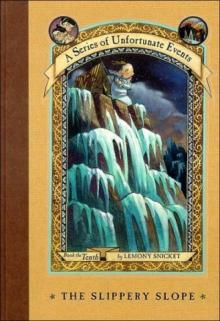 The Slippery Slope
The Slippery Slope Read Something Else
Read Something Else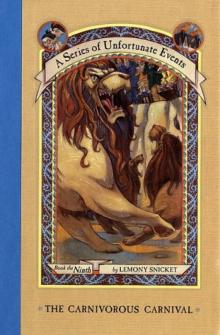 The Carnivorous Carnival asoue-9
The Carnivorous Carnival asoue-9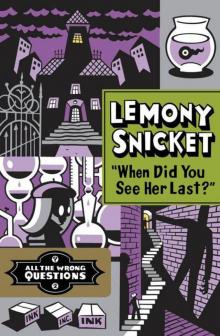 When Did You See Her Last
When Did You See Her Last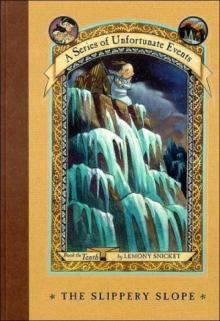 The Slippery Slope asoue-10
The Slippery Slope asoue-10 The Hostile Hospital asoue-8
The Hostile Hospital asoue-8 A Series of Unfortunate Events Collection: Books 1-13 with Bonus Material
A Series of Unfortunate Events Collection: Books 1-13 with Bonus Material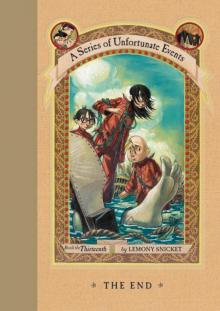 The End asoue-13
The End asoue-13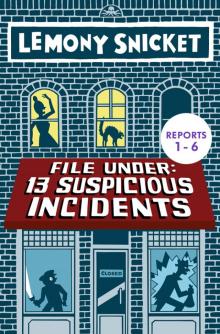 File Under
File Under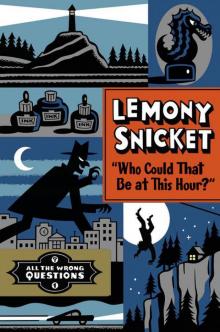 Who Could That Be at This Hour? (All the Wrong Questions)
Who Could That Be at This Hour? (All the Wrong Questions)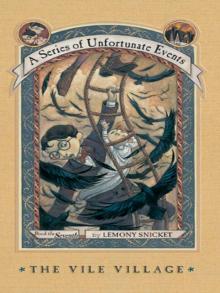 The Vile Village asoue-7
The Vile Village asoue-7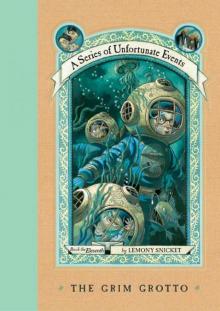 The Grim Grotto asoue-11
The Grim Grotto asoue-11